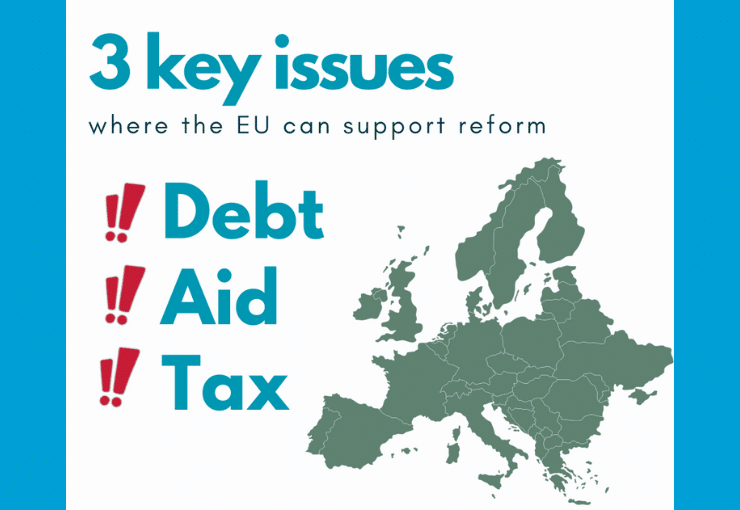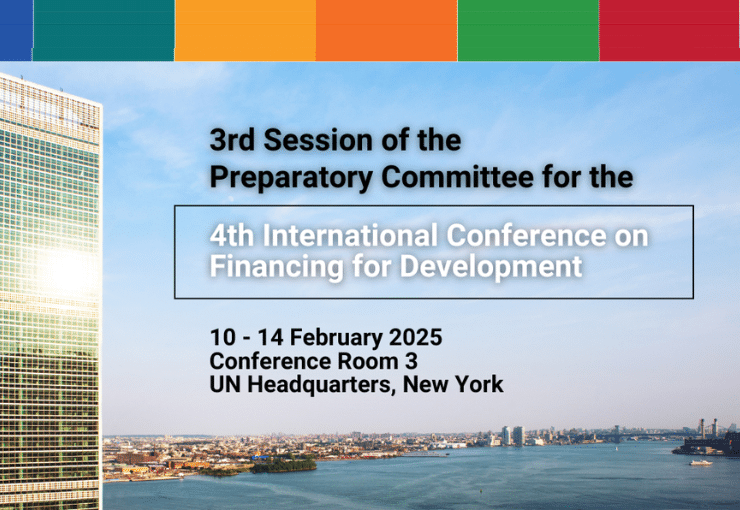Were there contentious issues this time?
Yes, there were many. Government representatives have commented that it was a battleground, especially in the very last stretch of the negotiations behind closed doors (hidden from the public eye). Leaving the US aside, which basically objected against the whole negotiated document, nearly all countries or country groups had amendments on paragraphs they did not agree with until last weekend.
Take one of the most contentious and urgent issues, debt. The African Forum and Network on Debt and Development (AFRODAD) alerted us that a group of higher income countries, led by the United Kingdom (UK) and the European Union (EU), specifically objected to a section in the text that promised that governments would initiate a process to fix the international debt architecture under the UN, where all countries would have an equal seat at the table. The African Union, leading lower-income countries, defended this commitment that had been in the outcome document since the very beginning and thus had already gone through all official negotiation rounds. The paragraph was not deleted, but the action commitment was downgraded to a mere intention to “make recommendations”. This is not just a last-minute change – it is a severe weakening of the commitment.
In the adoption session on 17 June, the EU emphasized that FfD4, against the backdrop of existential global challenges, should essentially be about multilateralism that delivers. The question is: what kind of multilateralism? The EU pushed for the strengthening of the existing financial architecture that is led by institutions like the Organisation for Economic Co-operation and Development (OECD), G20 and Paris Club, which consist of only a limited number of countries, higher-income countries. A very exclusive kind of multilateralism.
What was the position of the Dutch government?
The Dutch government fully aligns with the EU position for FfD4 and had helped to shape that position. It mainly aims to promote innovative financing solutions to leverage private, return-seeking finance for development, and to improve the existing international financial architecture instead of fundamentally reforming it.
What does the early adoption of the FfD4 outcome document mean?
The adoption means that the document contains text that is apparently acceptable to all countries except the US. The Seville Commitment is, however, both a commitment and a compromise. The co-facilitators of the process – Zambia, Norway, Nepal and Mexico – commented on it this way, while also hailing it as a landmark achievement. CSOs engaging in the FfD4 processes, Wemos included, grief about the fact that higher-income countries have not been more cooperative on pertinent issues like debt.
How does Wemos assess the adopted FfD4 outcome document?
Comparing the paragraphs of the adopted outcome document to the draft, we zoom in on the following changes:
- The commitment “to close financing gaps in the provision of essential public services” in health and other important sectors was deleted. This is very unfortunate because it is a crucial way for states to fulfil their obligations to people in a universal, equitable and cost-effective manner. In reaction to the zero draft of the outcome document, we had made a plea to retain this important commitment and to reinforce it by adding the crucial role of public finance to the provision of essential public services.
- The document contains a recommitment to “invest in Universal Health Coverage and inclusive, equitable, affordable, resilient and quality health systems”. Although it is good, it is less concrete than the deleted paragraph on closing financing gaps in the provision of essential public services.
- It is good that governments still emphasize that “public resources, policies and plans will be at the heart” of sustainable development efforts (paragraph 26). In a development area like health, this is of the utmost importance.
- However, on the biggest drain of the public purse in lower-income countries – debt – the most promising commitment to international debt architecture under the UN was heavily downgraded to a mere intention to formulate recommendations (paragraph 50f). This is not what we had hoped for when amplifying our joint civil society call to European leaders to cooperate in initiating a process towards a UN Framework Convention on Sovereign Debt.
- On another big obstacle to domestic resource mobilization – cross border tax avoidance – we are glad that all governments intend “to engage constructively in the negotiations on a United Nations Framework Convention on International Tax Cooperation” (paragraph 28b), while higher-income countries had thus far tried to divert the course of this highly promising legally binding instrument.
- On the current problems in international development cooperation, the outcome document does not contain any concrete commitments to truly inclusive solutions. It only promises to learn and exchange through, for instance, a “revitalized Development Cooperation Forum” (paragraph 40d). We would have rather seen a commitment to upgrade the Development Cooperation Forum and transform it into a process towards a UN Convention.
So, it is good news that there are relatively fair commitments on tax?
Not exactly. FfD4 should be about a sound economic and financial system. At the moment, even if we were to get the world’s best tax system, mobilized public resources would still go into debt servicing, so down the drain. Lower-income countries would still lack resources for development and services, including for healthcare. Since all parts of the international financial architecture are interlinked, the debt architecture should also be reformed.
Based on our first assessment, the FfD4 outcome document doesn’t spell out the ideal commitments, nor does it set the agenda for dedicated UN-led processes on sovereign debt and international development cooperation, but it still provides ground for cooperation between all countries.




